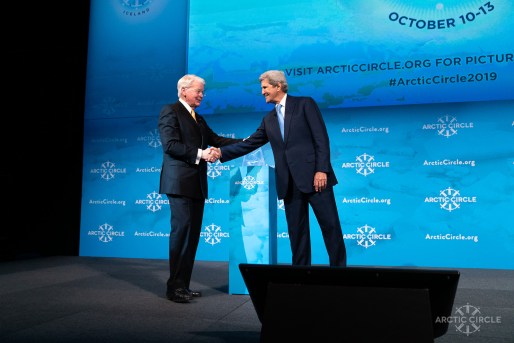
Thus, many panels at the conference made references to tipping points and amplification, and outside Harpa a more tangible demonstration of ice erosion could be seen. Similarly to last year, slabs of ice were placed at the front of the building for a display sponsored by Sermersooq Municipality in Greenland. However, the warmer-than-average temperatures in Reykjavík at the start of the event meant that the ice blocks were much smaller by conference’s end in comparison with their predecessors.


In addition to climate change topics, by far the most prominent subject at this year’s Arctic Circle was Greenland, including its politics, foreign policy interests and environmental challenges. In addition to speeches [video] by Prime Minister Kim Kielsen, a frequent guest at the Arctic Circle, other distinguished Greenlandic officials including Foreign Minister Ane Lone Bagger, former Greenland PM Aleqa Hammond, the lead officials of Greenland’s offices in Brussels, Copenhagen, Reykjavík and Washington, and the Mayor of Sermersooq, Charlotte Ludvigsen. Ms Ludvigsen was also the host of a Greenland Culture Night reception during the conference which featured Greenlandic cuisine and local bands Nanook and Small Time Giants, who succeeded in getting much of the crowd dancing.


Although the whole ‘purchasing Greenland’ story may have faded in the global press, the subject remains a sensitive one, as evidenced by a question posed by a Bloomberg reporter to Prime Minister Kielsen about whether there had been a public discussion about the specifics of a potential sale of Greenland to the US. The Greenland leader’s response [video], ‘I will answer this in short, we are not for sale, and we cannot be valued, estimated. You cannot exchange Greenland with money,’ prompted loud applause in the main hall of Harpa.

As well, Japan’s Arctic Ambassador, Ms Mari Miyoshi, announced [video] that next year’s Arctic Science Ministerial would be held in November in Tokyo, (co-hosted by Iceland), and spoke about the need for Japan to develop its three pillars of Arctic policy: research and development, international cooperation and sustainable use. Japan will also be hosting the next Arctic Circle forum in November 2020. India, another state in the ‘Asia-Arctic Five’ group, highlighted its developing interests in cryospheric and oceanic studies in the Polar Regions as well as the Himalayas, frequently referred to as the ‘Third Pole’.
As with previous Arctic Circle events, representatives of non-Arctic governments presented their specific regional engagement policies with Arctic states as well as the region as a whole. The government of Scotland, which had published its first Arctic policy framework earlier this month, elucidated its interest in expanding Arctic links at this year’s event. As explained [video] by Scottish Minister for Energy, Connectivity and the Islands, MSP Paul Wheelhouse, the focus of Scotland’s engagement in the Arctic would be heavily based on economic and educational cooperation, while acknowledging the potential restrictions on such policies posed by the still very much uncertain Brexit process. As Mr Wheelhouse added, ‘Scotland is the world’s closest non-Arctic nation’, with strong historical and current Arctic links.
Switzerland’s Arctic Ambassador, Stephan Estermann, presented an expanded Arctic policy vision [video] for his country, which was the most recent one to enter the Arctic Council as an observer, in 2017, drawing upon Switzerland’s previous experiences in both Arctic exploration, most notably in Greenland, as well as studies of Arctic glaciers closer to home in the Alps, which is also experiencing ice erosion effects. Last month, a public funeral was held for the Pizol glacier, located in the Glarus region of the Swiss Alps, in canton St Gallen close to the border of Austria and Liechtenstein, after it was determined that Pizol had lost too much ice mass to retain its classification as a glacier.

The two keynote speeches by senior United States officials were a study in contrasts. US Energy Secretary Rick Perry, who last week was subpoenaed by the House of Representatives regarding the spreading Ukraine scandal, discussed the possibilities of expanded energy technology in the Arctic while studiously avoiding any mention of climate change given that the current occupant of the White House remains a steadfast denier of climate change itself. He also stressed the need for the Arctic to ‘liberate’ itself from ‘non-democratic’ nations, without going into specifics. Unlike numerous other plenary speakers at this event, he did not take questions from the audience. As a recent commentary in Cryopolitics suggested, Mr Perry’s speech would have been a better fit in 2013, when oil prices were high and talk of energy scramble in the Arctic was ubiquitous.

Mr Kerry was considerably less sanguine than Mr Perry about US policies in the Arctic, and while not mentioning the current US president by name was critical of the current administration’s approach to growing climate change problems. In his acceptance speech [video], he explained a new initiative to combat climate change effects, World War Zero, which would include other senior American politicians including former California governor Arnold Schwarzenegger and former head of the American Environmental Protection Agency Christine Todd Whitman. Mr Kerry hoped that the US-led initiative would enlist other major powers given the urgency of the crisis on a global level.
